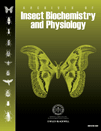
ARCHIVES OF INSECT BIOCHEMISTRY AND PHYSIOLOGY
Scope & Guideline
Driving Innovation in Insect Research and Applications
Introduction
Aims and Scopes
- Insect Molecular Biology:
Research focused on the molecular mechanisms that govern insect development, reproduction, and behavior, often utilizing techniques such as RNA sequencing and gene editing (e.g., CRISPR/Cas9). - Physiological Responses to Environmental Changes:
Studies examining how insects adapt physiologically to environmental stressors such as temperature extremes, pesticides, and pathogens, often incorporating biochemical assays and transcriptomic analyses. - Insect Immune Responses:
Investigations into the immune systems of insects, including the identification of immune-related genes and proteins, and their roles in defense against pathogens and parasites. - Biochemical Pathways and Metabolism:
Research on metabolic pathways in insects, including lipid metabolism, energy production, and the role of specific enzymes and proteins in these processes. - Insect-Plant Interactions and Pest Management:
Studies exploring the interactions between insects and their host plants, including the impact on pest management strategies through biochemical and ecological approaches.
Trending and Emerging
- Genomic and Transcriptomic Analyses:
There is an increasing emphasis on using genomic and transcriptomic approaches to uncover the genetic basis of insect traits, including resistance to pesticides and adaptations to environmental stressors. - CRISPR and Genetic Engineering:
The application of CRISPR/Cas9 technology for gene editing in insect models is gaining traction, allowing for precise studies of gene function and potential pest control strategies. - Microbiome Studies in Insects:
Emerging research on insect microbiomes and their impact on host physiology, metabolism, and immune responses is becoming more prominent, reflecting a growing interest in the interactions between insects and their microbial communities. - Environmental Stress and Insect Adaptation:
Research focusing on how insects adapt to climate change and other environmental stressors is trending, particularly studies that examine physiological and biochemical responses to temperature fluctuations and chemical exposures. - Insect Biotechnology and Pest Management Innovations:
There is a noticeable increase in studies exploring biotechnological applications for pest management, including the development of novel insecticides and biocontrol methods leveraging insect biochemistry.
Declining or Waning
- Traditional Insect Physiology:
Research that primarily focused on basic physiological functions without integrating molecular biology approaches has become less frequent as the field moves towards more integrative and molecularly driven studies. - Insect Toxicology with Limited Mechanistic Insight:
Studies centered solely on the toxicological effects of pesticides without exploring underlying biochemical mechanisms or resistance development have decreased, as more comprehensive approaches are favored. - Morphological Studies:
Research primarily focused on the morphological characteristics of insects has waned as molecular and genetic analyses provide more detailed insights into insect biology.
Similar Journals
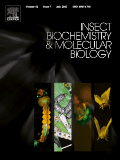
INSECT BIOCHEMISTRY AND MOLECULAR BIOLOGY
Advancing the Frontiers of Insect ScienceINSECT BIOCHEMISTRY AND MOLECULAR BIOLOGY, published by Pergamon-Elsevier Science Ltd, stands at the forefront of interdisciplinary research focusing on the biochemical and molecular processes in insects. This esteemed journal, with an ISSN of 0965-1748 and E-ISSN of 1879-0240, serves as a vital resource for scientists and researchers interested in the intricacies of insect physiology and genetics. With a significant presence in the academic community, it holds impressive rankings, including Q2 in Biochemistry and Q1 in Insect Science according to the latest quartiles, reflecting its critical role in advancing knowledge in these fields. The journal's convergence of content from 1992 to 2024 illustrates its commitment to fostering long-term scholarly discourse. Researchers will appreciate its impact within the Agricultural and Biological Sciences and its contributions to understanding the molecular biology of insects. Although not an open-access journal, it provides complementary insights into the biochemistry and genetics of insects, making it indispensable for anyone keen on pushing the boundaries of entomological science.

Frontiers in Insect Science
Advancing the Insect Science FrontierFrontiers in Insect Science is a pioneering open-access journal dedicated to the advancement of knowledge in the field of insect science. Published by FRONTIERS MEDIA SA in Switzerland, this journal serves as a vital platform for researchers, professionals, and students to disseminate high-quality, peer-reviewed research spanning diverse topics within insect biology, ecology, and pest management. Since its establishment in 2021, the journal has gained recognition, ranking in the Q2 category of Insect Science with a Scopus ranking of #92 out of 181 in the field. With a commitment to promoting open access and collaboration, Frontiers in Insect Science is instrumental in fostering innovative research and practical applications essential for combating biodiversity loss and enhancing agricultural sustainability. As a freely accessible resource, it invites contributions that impact both fundamental and applied insect research, connecting a global network of scholars eager to explore the fascinating world of insects.
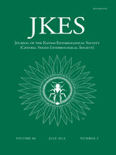
JOURNAL OF THE KANSAS ENTOMOLOGICAL SOCIETY
Unveiling the Secrets of Insect LifeJOURNAL OF THE KANSAS ENTOMOLOGICAL SOCIETY, published by the Kansas Entomological Society, serves as a vital platform dedicated to the field of entomology and insect science. With an ISSN of 0022-8567 and an E-ISSN of 1937-2353, this journal has established itself since its inception in 1994, continuing to contribute valuable research up to 2024. Despite its current Q4 categorization in the 2023 Insect Science rankings, it ranks 106 out of 181 in Scopus, representing a significant opportunity for researchers to disseminate their findings in a supportive and engaged community. Although it is not an open-access journal, its commitment to rigorous peer review and relevance in agricultural and biological sciences makes it an essential resource for professionals, scholars, and students alike. The journal's focus on local and regional entomological issues often addresses broader ecological impacts, showcasing the importance of insects in environmental health and agriculture. We invite you to explore the rich tapestry of findings and discussions within this esteemed publication.

JOURNAL OF INSECT SCIENCE
Championing Open Access in Insect ScienceJOURNAL OF INSECT SCIENCE, published by OXFORD UNIV PRESS INC, stands as a pivotal platform in the field of insect science, offering open-access research since 2001. With an impactful presence in the academic community, this journal spans the convergence of entomology and various interdisciplinary studies, establishing itself in the Q2 quartile for both Insect Science and Medicine (miscellaneous) categories as of 2023. This esteemed journal is recognized for its contributions to the understanding and management of insect biology, ecology, and their implications for agriculture and human health, garnering a Scopus rank of 44 out of 181 in Agricultural and Biological Sciences. The Open Access model encourages wide dissemination of knowledge, making the rich repository of research accessible to a global audience. With ongoing publications until 2024, JOURNAL OF INSECT SCIENCE serves as an essential resource for researchers, professionals, and students seeking to deepen their understanding of the crucial role insects play in our ecosystem.
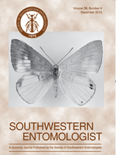
SOUTHWESTERN ENTOMOLOGIST
Bridging Research and Application in Southwestern EntomologySOUTHWESTERN ENTOMOLOGIST is a pivotal academic journal dedicated to advancing the fields of Agronomy, Ecology, and Insect Science. Published by the SOUTHWESTERN ENTOMOLOGICAL SOC in the United States, this journal plays a crucial role in disseminating vital research findings that address pressing ecological and agricultural challenges. With its ISSN 0147-1724 and E-ISSN 2162-2647, the journal has been publishing comprehensive studies since 1993 and continues to contribute significantly to the knowledge base up to 2024. As a Q4 ranked journal in both Agronomy and Crop Science and Ecology, as well as Insect Science, it provides an inclusive platform for researchers and students to share their insights and foster collaborations. Although it currently does not offer open access options, the content is accessible to academic institutions and professionals, ensuring that significant findings reach a broad audience. Given its niche focus, SOUTHWESTERN ENTOMOLOGIST not only appeals to researchers and students but also to professionals looking to stay updated on the latest trends and developments in entomology and its related fields.
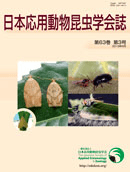
JAPANESE JOURNAL OF APPLIED ENTOMOLOGY AND ZOOLOGY
Exploring the Intricacies of Insect ScienceJapanese Journal of Applied Entomology and Zoology is a premier publication in the field of Insect Science, offering a platform for researchers and practitioners to share their findings on applied entomology and zoology. Established in 1957 and published by the Japan Society of Applied Entomology and Zoology, this journal aims to foster the understanding of insect-related studies that impact agriculture, ecology, and biodiversity. With an ISSN of 0021-4914 and E-ISSN of 1347-6068, it serves as a crucial resource for both academics and industry professionals. While the journal currently resides in the Q4 category of the Scopus ranking for Insect Science with a percentile of 11th, it plays a significant role in providing valuable insights into insect behavior, systematics, and their ecological roles. Readers can benefit from its published research to drive innovations and solutions in pest management and conservation practices. As the journal continues to evolve, it reinforces its commitment to disseminating critical research that supports sustainable practices in entomology and zoology through its convergence extending to the year 2024.
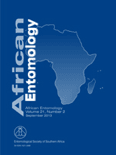
AFRICAN ENTOMOLOGY
Fostering Dialogue in the Vibrant World of Insect StudiesAFRICAN ENTOMOLOGY, published by the Entomological Society of Southern Africa, is a pivotal journal dedicated to the vibrant field of entomology and its related disciplines. With an ISSN of 1021-3589 and an E-ISSN of 2254-8854, it serves as an essential resource for researchers, professionals, and students interested in the intricacies of insect science across diverse ecological and agricultural landscapes. This journal, with a convergence of publications from 1994 to 2024, holds notable rankings, notably placing in Q2 for Agronomy and Crop Science and Q3 for both Ecology, Evolution, Behavior and Systematics and Insect Science as of 2023. The journal has made significant contributions to the knowledge and understanding of insect populations, their behaviors, and interactions within ecosystems, making it highly relevant for those engaged in agricultural practices and biodiversity conservation. AFRICAN ENTOMOLOGY welcomes original research articles, reviews, and special issues that broaden the dialogue surrounding entomological studies, and while it operates under conventional access policies, it remains an influential platform for scholarly discourse in Southern Africa and beyond.

REVISTA DE LA SOCIEDAD ENTOMOLOGICA ARGENTINA
Unveiling the Secrets of Insect Behavior and EcologyREVISTA DE LA SOCIEDAD ENTOMOLOGICA ARGENTINA is an esteemed open-access journal dedicated to the field of entomology, published by the SOCIEDAD ENTOMOLOGICA ARGENTINA. Since its transition to open access in 2013, the journal has sought to promote research in insect science, ecology, and related disciplines, facilitating global dissemination of knowledge and encouraging collaborative studies across borders. Located in the vibrant scientific landscape of La Plata, Argentina, the journal is indexed in Scopus and categorized in the fourth quartile of ecology and insect science, reflecting its commitment to enhancing the discourse within these critical fields. Aiming to bridge the gap between researchers, students, and professionals, REVISTA DE LA SOCIEDAD ENTOMOLOGICA ARGENTINA serves as a platform for innovative research, reviews, and reports on ecological interactions, behavior, and systematic entomology, ultimately driving forward our understanding of insect biodiversity and its broader environmental impacts.

REVISTA COLOMBIANA DE ENTOMOLOGIA
Cultivating Understanding of Insect LifeREVISTA COLOMBIANA DE ENTOMOLOGIA, published by the SOC COLOMBIANA ENTOMOLOGIA-SOCOLEN, serves as a vital platform for disseminating research in the field of insect science. With an ISSN of 0120-0488, the journal has established itself as a key resource for entomologists, agricultural scientists, and biodiversity researchers, focusing on the ecology, taxonomy, and behavior of insects within the Colombian context and beyond. Despite its Q4 ranking in 2023, REVISTA COLOMBIANA DE ENTOMOLOGIA strives to enhance its impact within the academic community, offering a space for innovative studies and reviews that aim to advance the understanding of insect-related phenomena. As a publication addressing critical concerns in agricultural and biological sciences, it invites contributions that explore new methodologies and findings relevant to the insect world. Although it does not currently offer Open Access options, the journal's growth from 2004 to 2024 reflects its commitment to evolving with the needs of its readership and contributors, making it an essential reference point for students and professionals alike interested in entomological research.
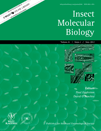
INSECT MOLECULAR BIOLOGY
Advancing the Frontiers of Insect GeneticsInsect Molecular Biology, published by Wiley, is a leading journal dedicated to advancing the field of insect biology through molecular perspectives. With a prominent ISSN of 0962-1075 and an E-ISSN of 1365-2583, this journal has gained a significant reputation since its inception in 1992, showcasing a diverse array of research that spans across genetics, molecular biology, and specific aspects of insect science. As of 2023, it has achieved a remarkable categorization, recognized as Q1 in Insect Science and Q3 in Genetics and Molecular Biology, underscoring its pivotal role in fostering academic discourse at the intersection of biology and technology. The journal is indexed in esteemed databases with strong rankings, sitting at the 82nd percentile in Insect Science, which highlights the impactful research it publishes. While it currently does not offer open access, Insect Molecular Biology remains an essential resource for researchers, students, and professionals eager to explore the complexities of insect life at the molecular level. By disseminating innovative findings and methodologies, the journal significantly contributes to both theoretical and applied entomological research, making it a cornerstone for anyone passionate about the intricate world of insects.